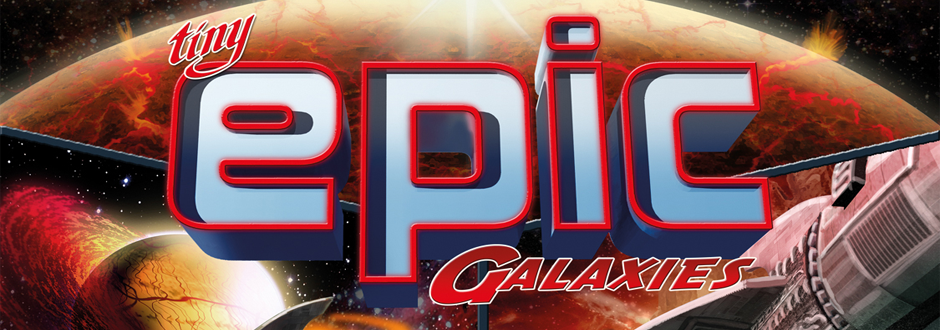If someone mentioned Gamelyn Games to me I would instantly think of the Tiny Epic Series. This is a series of small box games that have a short playtime but also have an in depth rule set. Tiny Epic Galaxies is one of the most well-known and popular games in this series and I wanted to see what all the fuss was about.
Tiny Epic Galaxies is a game where 1-5 players compete to conquer the Galaxy and it plays in around 30 minutes. You must develop your empire and colonise planets to score points and become the strongest galaxy.
The box it comes in is tiny (hence the name) but the number and quality of the components is very good. The art on the front is the typical colourful style you would expect from Gamelyn and it serves its purpose very well. The game has a neat easy to read rule book whilst the dice have symbols on them that relate to in game actions.
The art really shines on the player cards, planet cards and mission cards though and these carry the same colourful style from the box into the game.
How to Play Tiny Epic Galaxies
The game being so small gave me the impression it would be a simple filler game with little or no skill involved. The inclusion of dice also gave me the impression a lot of luck would be involved. A quick skim of the rules and I soon realised this game offers a lot of depth in such a small package.
You get to re-roll dice once per turn, spend energy to re-roll dice and more all this helps mitigate the luck that comes with dice.
Each player is given a Galaxy card (your player mat where your score, dice and ships are tracked) and a number of ships and other markers along with two secret mission cards. Players choose one of the mission cards and slides it under their Galaxy card, the mission is a way of scoring bonus points when the game ends.
The game is simple roll the amount of dice and perform actions relating to the symbols rolled.
- Move a ship - This allows you to move a ship from your Galaxy (or a planet) on to a planet. Two choices are available when moving to a planet you can either land and take an action straight away or you can attempt to colonise the planet by orbiting it and using a later action to take control of it. (see step three)
- Acquire Resources - This allows you to obtain either energy or culture from any planet you re on or orbiting. This is vital for upgrading your Empire.
- Advance Colonization - Once you have taken the move ship action to have a ship orbiting a planet card you use this action to move that ship one space forward on the colony track.
- Utilize a colony - This allows you to use a special skill from either your Galaxy card or a planet you have taken control of.
Players continue to do the above actions while upgrading the amount of ships and dice they have and this carries on until one player has reached 21 victory points.
Final Thoughts on Tiny Epic Galaxies
The game is very dice heavy and as I said above this concerned me as I am not a fan of games that have a huge amount of luck involved (games need some luck to remain fun for players of all different skill levels).
What Tiny Epic Galaxies does to mitigate the dice is very clever though, the way you must lock in dice to how you can spend energy to re-roll one really gives players some tactical thinking. There is even a dice converter placement area where you can convert two dice into the one you really want. This makes Tiny Epic Galaxies a great little game that requires players to think ahead while still having enough luck to make it enjoyable and unpredictable.
The game also has a very good solo mode that I must say is just as good as the multiplayer offering, which is rare. In this you play against a Galactic Empire that has gone rogue, and you compete against it to try to save the world. The actions basically remain the same as the set up and it took me several attempts to win this so it’s very challenging.
If you are after a game with a small box but with a lot of depth then this is for you. The game is challenging enough to keep you engaged, player interaction is helped with the follow player action. (When a player activates a die, players can choose to mimic that action for the cost of 1 culture).
The play time (around 40 minutes to an hour in my experience) is great and the game never out stays its welcome. The components are of good quality and for the cost of around £30 you should get a lot of play out of this.







Share